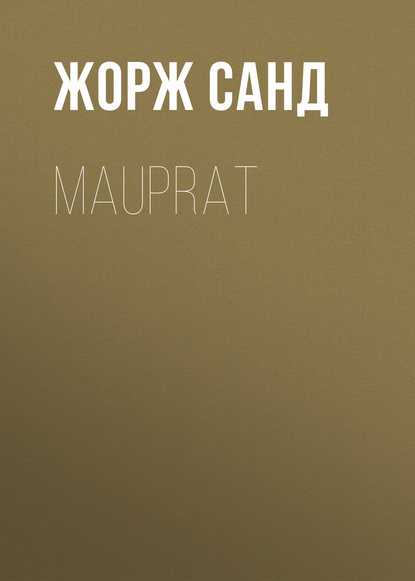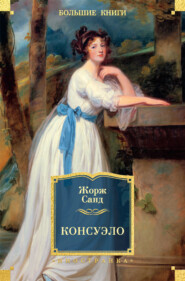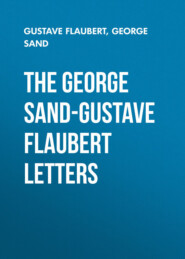По всем вопросам обращайтесь на: info@litportal.ru
(©) 2003-2025.
✖
Mauprat
Настройки чтения
Размер шрифта
Высота строк
Поля
And she was never more beautiful than when her natural pride and spirit were roused.
“My own opinion is that I am being very much over-educated,” I answered; “and that if I gave more heed to my natural good sense you would not jeer at me so much.”
“Really, it seems to me that you are indulging in a veritable war of wits with Bernard,” said M. de la Marche, folding his paper carelessly and approaching us.
“I cry quits with her,” I answered, annoyed at this impertinence. “Let her keep her wit for such as you.”
I had risen to insult him, but he did not seem to notice it; and standing with his back to the fire he bent down towards Edmee and said, in a gentle and almost affectionate voice:
“What is the matter with him?” as if he were inquiring after the health of her little dog.
“How should I know?” she replied, in the same tone.
Then she rose and added:
“My head aches too much to remain here. Give me your arm and take me up to my room.”
She went out, leaning upon his arm. I was left there stupefied.
I remained in the drawing-room, resolved to insult him as soon as he should return. But the abbe now entered, and soon afterward my Uncle Hubert. They began to talk on subjects which were quite strange to me (the subjects of their conversation were nearly always so). I did not know what to do to obtain revenge. I dared not betray myself in my uncle’s presence. I was sensible to the respect I owed to him and to his hospitality. Never had I done such violence to myself at Roche-Mauprat. Yet, in spite of all efforts, my anger showed itself. I almost died at being obliged to wait for revenge. Several times the chevalier noticed the change in my features and asked in a kind tone if I were ill. M. de la Marche seemed neither to observe nor to guess anything. The abbe alone examined me attentively. More than once I caught his blue eyes anxiously fixed on me, those eyes in which natural penetration was always veiled by habitual shyness. The abbe did not like me. I could easily see that his kindly, cheerful manners grew cold in spite of himself as soon as he spoke to me; and I noticed, too, that his face would invariably assume a sad expression at my approach.
The constraint that I was enduring was so alien to my habits and so beyond my strength that I came nigh to fainting. To obtain relief I went and threw myself on the grass in the park. This was a refuge to me in all my troubles. These mighty oaks, this moss which had clung to their branches through the centuries, these pale, sweet-scented wild flowers, emblems of secret sorrow, these were the friends of my childhood, and these alone I had found the same in social as in savage life. I buried my face in my hands; and I never remember having suffered more in any of the calamities of my life, though some that I had to bear afterward were very real. On the whole I ought to have accounted myself lucky, on giving up the rough and perilous trade of a cut-throat, to find so many unexpected blessings – affection, devotion, riches, liberty, education, good precepts and good examples. But it is certain that, in order to pass from a given state to its opposite, though it be from evil to good, from grief to joy, from fatigue to repose, the soul of a man must suffer; in this hour of birth of a new destiny all the springs of his being are strained almost to breaking – even as at the approach of summer the sky is covered with dark clouds, and the earth, all a-tremble, seems about to be annihilated by the tempest.
At this moment my only thought was to devise some means of appeasing my hatred of M. de la Marche without betraying and without even arousing a suspicion of the mysterious bond which held Edmee in my power. Though nothing was less respected at Roche-Mauprat than the sanctity of an oath, yet the little reading I had had there – those ballads of chivalry of which I have already spoken – had filled me with an almost romantic love of good faith; and this was about the only virtue I had acquired there. My promise of secrecy to Edmee was therefore inviolable in my eyes.
“However,” I said to myself, “I dare say I shall find some plausible pretext for throwing myself upon my enemy and strangling him.”
To confess the truth, this was far from easy with a man who seemed bent on being all politeness and kindness.
Distracted by these thoughts, I forgot the dinner hour; and when I saw the sun sinking behind the turrets of the castle I realized too late that my absence must have been noticed, and that I could not appear without submitting to Edmee’s searching questions, and to the abbe’s cold, piercing gaze, which, though it always seemed to avoid mine, I would suddenly surprise in the act of sounding the very depths of my conscience.
I resolved not to return to the house till nightfall, and I threw myself upon the grass and tried to find rest for my aching head in sleep. I did fall asleep in fact. When I awoke the moon was rising in the heavens, which were still red with the glow of sunset. The noise which had aroused me was very slight; but there are some sounds which strike the heart before reaching the ear; and the subtlest emanations of love will at times pierce through the coarsest organization. Edmee’s voice had just pronounced my name a short distance away, behind some foliage. At first I thought I had been dreaming; I remained where I was, held my breath and listened. It was she, on her way to the hermit’s, in company with the abbe. They had stopped in a covered walk five or six yards from me, and they were talking in low voices, but in those clear tones which, in an exchange of confidence, compels attention with peculiar solemnity.
“I fear,” Edmee was saying, “that there will be trouble between him and M. de la Marche; perhaps something very serious – who knows? You do not understand Bernard.”
“He must be got away from here, at all costs,” answered the abbe. “You cannot live in this way, continually exposed to the brutality of a brigand.”
“It cannot be called living. Since he set foot in the house I have not had a moment’s peace of mind. Imprisoned in my room, or forced to seek the protection of my friends, I am almost afraid to move. It is as much as I dare to do to creep downstairs, and I never cross the corridor without sending Leblanc ahead as a scout. The poor woman, who has always found me so brave, now thinks I am mad. The suspense is horrible. I cannot sleep unless I first bolt the door. And look, abbe, I never walk about without a dagger, like the heroine of a Spanish ballad, neither more nor less.”
“And if this wretch meets you and frightens you, you will plunge it into your bosom? Oh! that must not be. Edmee, we must find some means of changing a position which is no longer tenable. I take it that you do not wish to deprive him of your father’s friendship by confessing to the latter the monstrous bargain you were forced to make with this bandit at Roche-Mauprat. But whatever may happen – ah! my poor little Edmee, I am not a bloodthirsty man, but twenty times a day I find myself deploring that my character of priest prevents me from challenging this creature, and ridding you of him forever.”
This charitable regret, expressed so artlessly in my very ear, made me itch to reveal myself to them at once, were it only to put the abbe’s warlike humour to the proof; but I was restrained by the hope that I should at last discover Edmee’s real feelings and real intentions in regard to myself.
“Have no fear,” she said, in a careless tone. “If he tries my patience too much, I shall not have the slightest hesitation in planting this blade in his cheek. I am quite sure that a little blood-letting will cool his ardour.”
Then they drew a few steps nearer.
“Listen to me, Edmee,” said the abbe, stopping again. “We cannot discuss this matter with Patience. Let us come to some decision before we put it aside. Your relations with Bernard are now drawing to a crisis. It seems to me, my child, that you are not doing all you ought to ward off the evils that may strike us; for everything that is painful to you will be painful to all of us, and will touch us to the bottom of our hearts.”
“I am all attention, excellent friend,” answered Edmee; “scold me, advise me, as you will.”
So saying she leant back against the tree at the foot of which I was lying among the brushwood and long grass. I fancy she might have seen me, for I could see her distinctly. However, she little thought that I was gazing on her divine face, over which the night breeze was throwing, now the shadows of the rustling leaves, and now the pale diamonds that the moon showers down through the trees of the forest.
“My opinion, Edmee,” answered the abbe, crossing his arms on his breast and striking his brow at intervals, “is that you do not take the right view of your situation. At times it distresses you to such an extent that you lose all hope and long to die – yes, my dear child, to such an extent that your health plainly suffers. At other times, and I must speak candidly at the risk of offending you a little, you view your perils with a levity and cheerfulness that astound me.”
“That last reproach is delicately put, dear friend,” she replied; “but allow me to justify myself. Your astonishment arises from the fact that you do not know the Mauprat race. It is a tameless, incorrigible race, from which naught but Headbreakers and Hamstringers may issue. Even in those who have been most polished by education there remains many a stubborn knot – a sovereign pride, a will of iron, a profound contempt for life. Look at my father. In spite of his adorable goodness, you see that he is sometimes so quick-tempered that he will smash his snuff-box on the table, when you get the better of him in some political argument, or when you win a game of chess. For myself, I am conscious that my veins are as full-blooded as if I had been born in the noble ranks of the people; and I do not believe that any Mauprat has ever shone at court for the charm of his manners. Since I was born brave, how would you have me set much store by life? And yet there are weak moments in which I get discouraged more than enough, and bemoan my fate like the true woman that I am. But, let some one offend me, or threaten me, and the blood of the strong surges through me again; and then, as I cannot crush my enemy, I fold my arms and smile with compassion at the idea that he should ever have hoped to frighten me. And do not look upon this as mere bombast, abbe. To-morrow, this evening perhaps, my words may turn to deeds. This little pearl-handled knife does not look like deeds of blood; still, it will be able to do its work, and ever since Don Marcasse (who knows what he is about) sharpened it, I have had it by me night and day, and my mind is made up. I have not a very strong fist, but it will no doubt manage to give myself a good stab with this knife, even as it manages to give my horse a cut with the whip. Well, that being so, my honour is safe; it is only my life, which hangs by a thread, which is at the mercy of a glass of wine, more or less, that M. Bernard may happen to drink one of these evenings; of some change meeting, or some exchange of looks between De la Marche and myself that he may fancy he has detected; a breath of air perhaps! What is to be done? Were I to grieve, would my tears wash away the past? We cannot tear out a single page of our lives; but we can throw the book into the fire. Though I should weep from night till morn, would that prevent Destiny from having, in a fit of ill-humour, taken me out hunting, sent me astray in the woods, and made me stumble across a Mauprat, who led me to his den, where I escaped dishonour and perhaps death only by binding my life forever to that of a savage who had none of my principles, and who probably (and who undoubtedly, I should say) never will have them? All this is a misfortune. I was in the full sunlight of a happy destiny; I was the pride and joy of my old father; I was about to marry a man I esteem and like; no sorrows, no fears had come near my path; I knew neither days fraught with danger nor nights bereft of sleep. Well, God did not wish such a beautiful life to continue; His will be done. There are days when the ruin of all my hopes seems to me so inevitable that I look upon myself as dead and my fiance as a widower. If it were not for my poor father, I should really laugh at it all; for I am so ill built for vexation and fears that during the short time I have known them they have already tired me of life.”
“This courage is heroic, but it is also terrible,” cried the abbe, in a broken voice. “It is almost a resolve to commit suicide, Edmee.”
“Oh, I shall fight for my life,” she answered, with warmth; “but I shall not stand haggling with it a moment if my honour does not come forth safe and sound from all these risks. No; I am not pious enough ever to accept a soiled life by way of penance for sins of which I never had a thought. If God deals so harshly with me that I have to choose between shame and death.”
“There can never be any shame for you, Edmee; a soul so chaste, so pure in intention.”
“Oh, don’t talk of that, dear abbe! Perhaps I am not as good as you think; I am not very orthodox in religion – nor are you, abbe! I give little heed to the world; I have no love for it. I neither fear nor despise public opinion; it will never enter into my life. I am not very sure what principle of virtue would be strong enough to prevent me from falling, if the spirit of evil took me in hand. I have read La Nouvelle Heloise, and I shed many tears over it. But, because I am a Mauprat and have an unbending pride, I will never endure the tyranny of any man – the violence of a lover no more than a husband’s blow; only a servile soul and a craven character may yield to force that which it refuses to entreaty. Sainte Solange, the beautiful shepherdess, let her head be cut off rather than submit to the seigneur’s rights. And you know that from mother to daughter the Mauprats have been consecrated in baptism to the protection of the patron saint of Berry.”
“Yes; I know that you are proud and resolute,” said the abbe, “and because I respect you more than any woman in the world I want you to live, and be free, and make a marriage worthy of you, so that in the human family you may fill the part which beautiful souls still know how to make noble. Besides, you are necessary to your father; your death would hurry him to his grave, hearty and robust as the Mauprat still is. Put away these gloomy thoughts, then, and these violent resolutions. It is impossible. This adventure of Roche-Mauprat must be looked upon only as an evil dream. We both had a nightmare in those hours of horror; but it is time for us to awake; we cannot remain paralyzed with fear like children. You have only one course open to you, and that I have already pointed out.”
“But, abbe, it is the one which I hold the most impossible of all. I have sworn by everything that is most sacred in the universe and the human heart.”
“An oath extorted by threats and violence is binding on none; even human laws decree this. Divine laws, especially in a case of this nature, absolve the human conscience beyond a doubt. If you were orthodox, I would go to Rome – yes, I would go on foot – to get you absolved from so rash a vow; but you are not a submissive child of the Pope, Edmee – nor am I.”
“You wish me, then, to perjure myself?”
“Your soul would not be perjured.”
“My soul would! I took an oath with a full knowledge of what I was doing and at a time when I might have killed myself on the spot; for in my hand I had a knife three times as large as this. But I wanted to live; above all, I wanted to see my father again and kiss him. To put an end to the agony which my disappearance must have caused him, I would have bartered more than my life, I would have bartered my immortal soul. Since then, too, as I told you last night, I have renewed my vow, and of my own free-will, moreover; for there was a wall between my amiable fiance and myself.”
“How could you have been so imprudent, Edmee? Here again I fail to understand you.”
“That I can quite believe, for I do not understand myself,” said Edmee, with a peculiar expression.
“My dear child, you must open your hear to me freely. I am the only person here who can advise you, since I am the only one to whom you can tell everything under the seal of a friendship as sacred as the secrecy of Catholic confession can be. Answer me, then. You do not really look upon a marriage between yourself and Bernard Mauprat as possible?”
“How should that which is inevitable be impossible?” said Edmee. “There is nothing more possible than throwing one’s self into the river; nothing more possible than surrendering one’s self to misery and despair; nothing more possible, consequently, than marrying Bernard Mauprat.”
“In any case I will not be the one to celebrate such an absurd and deplorable union,” cried the abbe. “You, the wife and the slave of this Hamstringer! Edmee, you said just now that you would no more endure the violence of a lover than a husband’s blow.”
“You think the he would beat me?”
“If he did not kill you.”
“Oh, no,” she replied, in a resolute tone, with a wave of the knife, “I would kill him first. When Mauprat meets Mauprat.!”
“You can laugh, Edmee? O my God! you can laugh at the thought of such a match! But, even if this man had some affection and esteem for you, think how impossible it would be for you to have anything in common; think of the coarseness of his ideas, the vulgarity of his speech. The heart rises in disgust at the idea of such a union. Good God! In what language would you speak to him?”
Once more I was on the point of rising and falling on my panegyrist; but I overcame my rage. Edmee began to speak, and I was all ears again.
“I know very well that at the end of three or four days I should have nothing better to do than cut my own throat; but since sooner or later it must come to that, why should I not go forward to the inevitable hour? I confess that I shall be sorry to leave life. Not all those who have been to Roche-Mauprat have returned. I went there not to meet death, but to betroth myself to it. Well, then, I will go on to my wedding-day, and if Bernard is too odious, I will kill myself after the ball.”

















